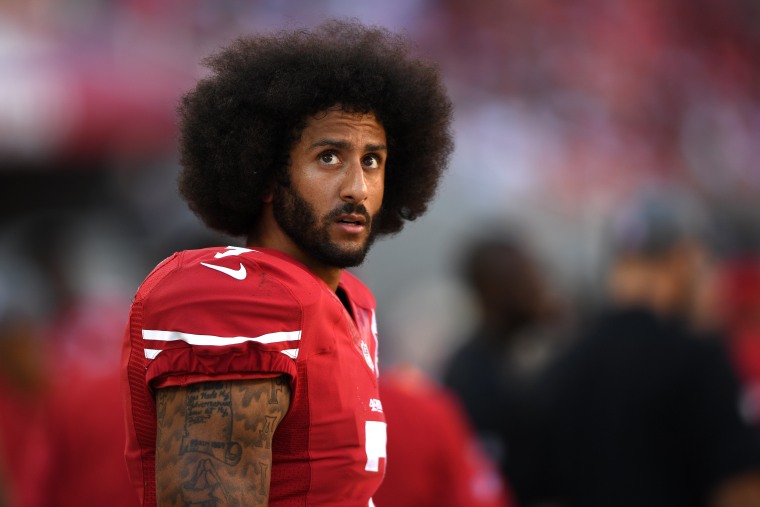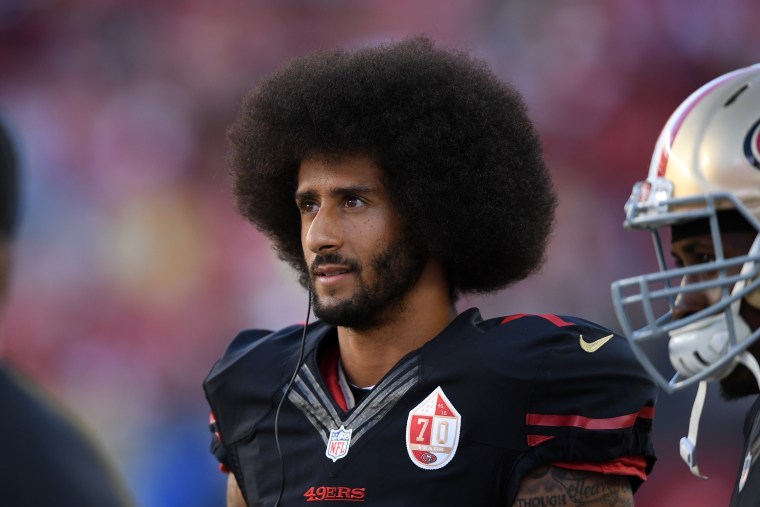
When NFL star Colin Kaepernick decided to kneel during the national anthem at NFL games, there were always people on both sides of the aisle creating arguments about why they were in favor of or against his actions.
But after the quarterback acknowledged that he did not vote in our most recent American presidential election, he saw some of his supporters make a complete 180-degree turn.
On November 8, reporters asked Kaepernick if he had voted and whether he was going to vote at all. To both questions he replied, “No.”
With one word, “No,” Colin Kaepernick effectively eliminated the “support” of some including one of his most vocal ex-supporters, sports journalist and talking head, Stephen A. Smith. The dismissal of what some would label, the power of the vote, infuriated Stephen A. Smith to the point where he wailed, “As far as I’m concerned, Kaepernick is absolutely irrelevant.”
Irrelevant?
RELATED: OpEd: Colin Kaepernick and the Racist History of Our National Anthem
In the fall of 2010, I walked into the office of Thomas Kerver, Executive Director of the Hetrick Martin Institute (HMI), looking for volunteer opportunities and I walked out with a job.
It was my first significant engagement with young people who identified as lesbian, gay, bisexual or transgender. My fear was damn near palpable, as witnessed by a young person who asked me during the interview process, “Are you afraid?”
Systemic and institutional racism begin their attack on the most marginalized with lethal and immediate consequences for young black and brown folks.
I laughed it off with feigned confidence and replied, “no,” attempting to continue executing the lesson plan. My nervousness was partially caused by the suppressed realization that I was unqualified and incapable of ‘saving’ these so-called ‘at-risk’ youth.
It was during this time that my supervisor at HMI, Lillian Rivera, told me, “Remember, the young people’s successes are not your successes and their failures are not your failures. These ‘at-promise’ young people do not need to be saved.”
At the time I lacked the critical thinking skills to comprehend the wisdom she was attempting to hand down to me, so I drowned my fear in assumptions. I relied on bravado instead of genuine curiosity. My thirst to be seen as right was an attempt to protect my ego from the love that was always within my reach.
But to grasp that love, and to grow would require me to admit something challenging – this wasn’t about me.
And Colin Kaepernick’ s protest, both kneeling during the anthem and abstaining from casting a ballot, is not about Stephen A. Smith, and it’s not about me.
His protest is about ending the oppression of black and brown folks in this country.
I’m black, as is Stephen A. Smith. It’s clear that Kaepernick understands one of the hardest truths: systemic and institutional racism begin their attack on the most marginalized with lethal and immediate consequences for young black and brown folks.
Beyond the potential generational gap, there’s significant privilege in having the luxury to debate on television, in blogs, and on social media the relevance of Kaepernick’ s actions, while millions of homeless folks are preparing to face a harsh winter; young boys and girls are being cycled out of schools and into jails and prisons; our transgender family members are taking their lives fearing what a Trump led America holds for them; and undocumented folks live in consistent terror of deportation and/or exploitation.
Many young adults I spoke with have a nuanced and educated understanding of what voting represents and they also understand the history of voting disenfranchisement for people of color in America and abroad.
When exchanging thoughts about Kaepernick with Sean J. Ahn, an East Asian college student he told me, “It may sound ironic but not voting for one candidate is one way to voice your opinion if one truly doesn’t endorse any candidate. There is a difference ethically between an active refusal and idle indifference. If Kaepernick’s decision was based on the former, I don’t see any problem with it.”
Recently Colin Kaepernick showed us all where his heart, head and dollars align, when he held a “Know Your Rights” camp for youth who lack the protections of fame, fortune and suburban living. His camp provided these at-promise youth with life-saving skills in an effort to offer them more than just words of hope to combat the forces that Kaepernick knows await many of them because they don’t have the social, political and economic capital to hold the system accountable.
When asked why he didn’t vote Kaepernick explained, “So, for me, it's another face that's going to be the face of that system of oppression. "And to me, it didn't really matter who went in there. The system still remains intact that oppresses people of color."
Kaepernick is protesting and organizing for individuals like, 25-year-old Gia Love, a black trans woman living in New York City. When asked about Kaepernick’s decision to not vote, she offered: “Attempts to center a protest around societies comfort or standard of acceptability of resistance provides more reason for why the protest should take place. [Kaepernick] did not vote because he’s apathetic to the state of politics in this country. He did not vote because he made a conscious decision to not engage in the very politics that oppress him. What better way to resist a system then to reject the system in its totality.”
Gia Love is not alone in her thinking.
Young people like Jalen Clark, a black 13 year-old high school freshman at the High School of Community Leadership in Queens, understand that Kaepernick’s actions extend well beyond symbolic gestures and that many including himself are thinking critically about how Kaepernick’s actions connect to their own lived experiences.
RELATED: Lebron James Supports Colin Kaepernick, Fears for His Own Sons
I wasn’t surprised when Clark said, “I believe Kaepernick’s decision to not vote is controversial but despite that, his decision is entirely justified. Neither candidate expressed their concern around major issues impacting black communities especially pertaining to poverty and the increasingly large numbers of black individuals being killed by authority.”
So tell me again how Colin Kaepernick is irrelevant.
To Stephen A. Smith, Kaepernick might be irrelevant, but to many others like Evann Smith, a 22 year-old black woman who is both attending college and working; Kaepernick is doing the work of educating, inspiring and holding us all accountable. Smith brilliantly placed the responsibility on us all to add to what Colin Kaepernick has done by saying, “Kaepernick was successful in forcing people to recognize that there is indeed an issue with justice in America and fostering conversations about it. Now, those of us who back Colin should be organizing and working to effect tangible improvements.”
Saying Kaepernick is irrelevant because of a conscious action he took that is in line with his politics simply because it challenges the political mores of society, misses the point. If he was in the streets protesting Trump’s presidency, then he would be a hypocrite who lost his right to comment. Instead, he is too busy affecting change in his community.
Stephen A. Smith’s opinion of Colin Kaepernick is what’s irrelevant.
Former NFL player Wade Davis is currently an NFL diversity consultant and Senior Consultant at the Global Leadership Consultancy, YSC. Also, Wade is the Director of Pro Sports at the You Can Play Project, a writer, activist and feminist.
